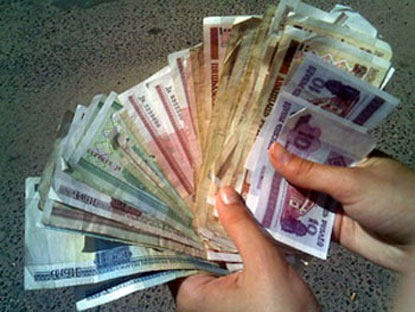
Is Belarus a Basket Case?
Publication: Eurasia Daily Monitor Volume: 8 Issue: 179
By:

For the last fifteen years, Belarus has been the world’s leader in terms of the sheer number of predictions of its imminent economic collapse. And yet since 1996, the country has demonstrated steady, impressive and, in the words of a 2005 World Bank report, “broad-based” economic growth. On the Human Development Index list, Belarus (61st) is ahead of Russia (65th) and Ukraine (69th), with which Belarusians routinely compare their country. To be sure, current financial distress in Belarus is real. According to Moody’s, Belarus has to borrow from $3.5 billion to $6 billion this year and about the same amount next year in order to eliminate its current account deficit and prop up the ruble (Interfax, August 23). This is a lot. But compare this to $110 billion pledged by the international lenders to Greece, whose population size is the same as Belarus’s. It is true that Greece is perceived as a democracy and Belarus is not, but both spent beyond their means – only in Greece the imbalance is worse. Greece’s GDP is now in freefall, while Belarus’s GDP did not decline even in 2009. From January to August 2011, it was growing at the annual rate of 9.1 percent, although the IMF has lowered its full year growth estimate from 5.5 percent to 5.0 percent (Interfax, September 21).
Belarus’s fiscal outlook is actually beginning to look less bleak. In June 2011, Belarus received the first tranche, $800 million, out of a $3 billion loan pledged by the Eurasian Economic Community’s (EurAsEC); and $2.5 billion will be paid by Russia’s Gazprom for the remaining 50 percent of Beltransgaz (a natural gas infrastructure and transportation company). On September 18, China announced a $1 billion loan to Belarus (https://www.tvr.by/rus/economics.asp?id=54704); and Russia’s Sberbank announced its own $1 billion loan with no collateral (Belta, September 12). It first offered $2 billion with 35 percent of shares of Belaruskalii, a major potash producer, as collateral (www.gazeta.by, August 20), but Minsk rejected that offer. Belarusian exporters have about $5 billion on their accounts in foreign banks, and some of these funds can be retrieved (Belta, August 30). Finally, since January 2012, Russia will be selling natural gas at a discount (probably between 15 percent and 30 percent) to make it clear to Ukraine what happens if a country joins the Custom Union (www.naviny.by, September 1). This is important, as price hikes on oil and gas are by far the major cause of the current financial distress.
In addition, there are several other resources to tap to improve Belarus’s economic situation. For example, the country could benefit from reasonable import substitution (on September 16, Belarusian Prime Minister Mikhail Myasnikovich stated that 68 percent of the country’s GDP is produced from foreign raw materials and/or semi-finished products); boosting exports (Belarus’s international trade balance was positive in May, July, and August 2011 for the first time in many years); trimming wasteful spending in agriculture and housing construction; and, most importantly, privatization (Belarus Segodnya, September 22).
It is a cliché that if anybody is precluding privatization, it is Lukashenka because he hates the idea of losing the reins of control. Indeed, there is no commitment to sell the largest state-run firms, including two refineries. But aside from some thirty industrial giants, there are hundreds of medium-sized enterprises, and their directors work tirelessly to obstruct their privatization in part by mobilizing their personnel against potential private owners. Directors fear that the new owners may fire them, and workers are easy to stir up against privatization because they know what happened in Russia. Such insidious and bottom-up, not top-down, anti-privatization strategies became the topic of an interview by Georgy Kouznetsov, Chairman of Belarus State Property Committee, to Belaruskaya Gazeta (Belaruskaya Gazeta, July 25). Later, on September 8, the major Belarus’s daily Belarus Segodnya furnished similar information but averred that 180 state-run enterprises are going to be sold by the end of 2011 anyway (Belarus Segodnya, September 8).
Returning to international loans, on September 20-25 Belarus sent a two-person delegation to the IMF trying to arrange a new loan. An IMF team will arrive in Minsk on October 5. On May 31, Belarus asked the IMF to issue a loan of between $3.6 billion and $8 billion. The opposition media made the most of the IMF’s reluctance to lend Belarus money, allegedly revealed in the IMF’s Country Report of August 29. Indeed, on September 8, Lukashenka accused the IMF of setting political preconditions (Belta September 9). The reality, however, is more nuanced. First, the IMF does not set political preconditions, at least overtly. Second, on August 29, it was not expected to make a final decision. On that day, the IMF’s country directors shared their views about the country’s financial situation. Their presentations are never made public. If they were, the one to watch would not be the US or Germany, but Russia. There is suspicion that Russia wants the IMF to reject the Belarusian loan application. That would give Russia ammunition to also deny Belarus the second tranche of the EurAsEC loan, which is de facto Russia’s. On July 8, Russia’s Finance Minister Alexei Kudrin (who has just resigned) hinted at that possibility (www.tut.by, July 8). If Belarus fails to borrow, it might have to sell its largest enterprises to Russian oligarchs that have long been coveting them (https://naviny.by/rubrics/opinion/2011/08/04/ic_articles_410_174625/).
Meanwhile, hard currency is returning to Belarusian banks’ exchange outlets where on September 23, $1 could be obtained for 7,680 BR, down from 8,060 BR one week ago (https://afn.by/finances/currency/banks.asp). Moreover, the Belarusian foreign minister received an invitation to take part in the EU’s Eastern Partnership meeting in Warsaw, though the Belarusian Ambassador to Poland will represent Minsk in his place – life goes on.




